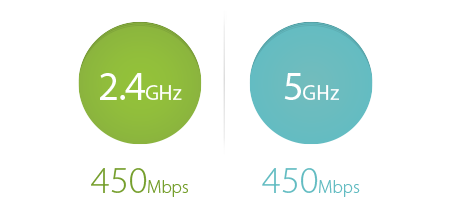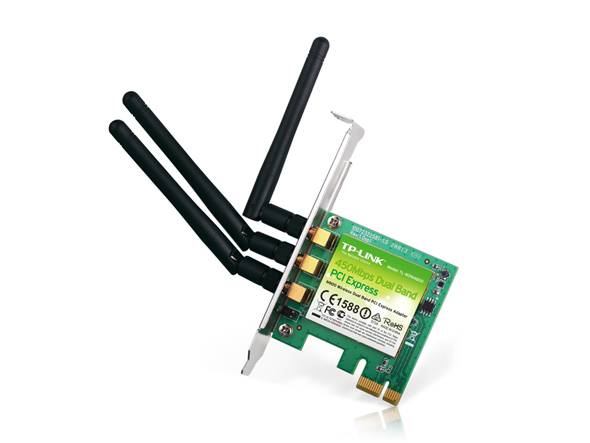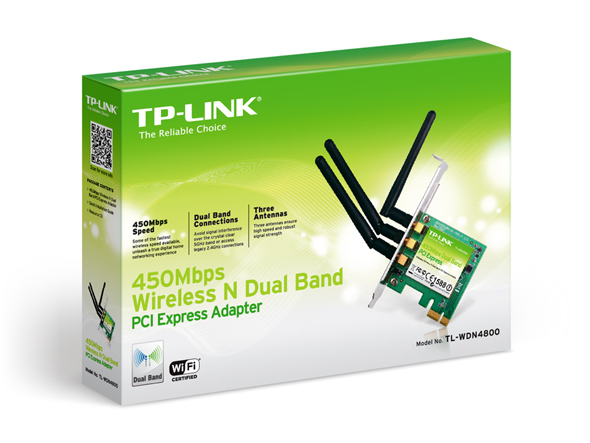TL-WDN4800
End of LifeN900 Wireless Dual Band PCI Express Adapter
- Dual Band support - 2.4GHz or 5GHz channels bring an optimized HD video streaming, file sharing and online experience
- Today’s fastest wireless speeds of up to 450Mbps
- Three antennas increase wireless performance and stability
|
What This Product Does
TP-LINK’s 450Mbps Wireless N Dual Band PCI Express Adapter, TL-WDN4800 allows you to connect a desktop computer to a wireless network and access a high-speed wireless network connection. Complying with IEEE 802.11a/b/g/n, the device can use the 2.4GHz or 5GHz channels and provide wireless speeds of up to 450Mbps which is ideal for users seeking a highly robust, bandwidth intensive wireless networking experience, particularly with HD video streaming and online gaming.
|
| Wireless N Speed up to 450Mbps
Both the adapter’s 2.4GHz and 5GHz bands support the maximum speed of up to 450Mbps, which generates a maximum theoretical wireless throughput bringing you a limitless wireless experience.
|
 |

Dual Band
Dual Band is the latest wireless technology allowing the adapter to connect with a 2.4GHz or 5GHz network. This allows you to check e-mail and browse the Internet using the 2.4GHz band or stream HD movies and other media on the 5GHz band. The advantage of working on the 5GHz band is that, unlike the crowded 2.4GHz band shared with microwaves, cordless phones and other wireless networks, it has much less interference and can provide a more stable wireless signal, which is ideal for online gaming and HD video streaming.
-

WPA / WPA2 Encryptions
WPA/WPA2 encryption standards ensure your wireless connection is safe from intruders.
-

Easy Setup
Either using the optimized user interface and setup wizard or the CD (included) setup wizard will allow you to get ‘online’ quickly and easily.
| HARDWARE FEATURES | |
|---|---|
| Interface | PCI Express x1 |
| Antenna | Omni Directional, Detachable (RP-SMA) |
| Antenna Gain | 3 x 2dBi |
| WIRELESS FEATURES | |
|---|---|
| Wireless Standards | IEEE 802.11n, IEEE 802.11g, IEEE 802.11b, IEEE 802.11a |
| Frequency | 2.4-2.4835GHz 5.180-5.240GHZ 5.745-5.825GHz |
| Signal Rate | 11n: Up to 450Mbps(dynamic) 11g: Up to 54Mbps(dynamic) 11b: Up to 11Mbps(dynamic) 11a: Up to 54Mbps(dynamic) |
| Reception Sensitivity | 405M_2.4GHz: -68dBm@10% PER 270M_2.4GHz: -70dBm@10% PER 195M_2.4GHz: -71dBm@10% PER 130M_2.4GHz: -74dBm@10% PER 54M_2.4GHz: -79dBm@10% PER 11M_2.4GHz: -87dBm@8% PER 6M_2.4GHz: -94dBm@10% PER 1M_2.4GHz: -99dBm@8% PER 405M_5GHz: -64dBm@10% PER 270M_5GHz: -67dBm@10% PER 195M_5GHz: -70dBm@10% PER 130M_5GHz: -73dBm@10% PER 54M_5GHz: -79dBm@10% PER 6M_5GHz: -92dBm@10% PER |
| Wireless Modes | Ad-Hoc / Infrastructure mode |
| Wireless Security | Support 64/128 bit WEP, WPA-PSK/WPA2-PSK,802.1x |
| Modulation Technology | DBPSK, DQPSK, CCK, OFDM, 16-QAM, 64-QAM |
| Transmission Power | <20dBm(EIRP) |
| OTHERS | |
|---|---|
| Certification | CE, FCC, RoHS,Wi-Fi |
| Package Content | Wireless Adapter Resource CD Quick Installation Guide |
| System Requirements | Windows 8.1/8(32/64bits), Windows 7(32/64bits), Windows Vista(32/64bits), Windows XP(32/64bits) |
| Environment | Operating Temperature: 0℃~40℃ (32℉~104℉) Storage Temperature: -40℃~70℃ (-40℉~158℉) Operating Humidity: 10%~90% non-condensing Storage Humidity: 5%~90% non-condensing |
† Maximum wireless signal rates are the physical rates derived from IEEE Standard 802.11 specifications. Range, coverage, and the maximum number of connected devices are based on test results under normal usage conditions. Actual wireless data throughput, wireless coverage, and number of connected devices are not guaranteed and will vary as a result of 1) environmental factors, including building materials, physical objects, and obstacles, 2) network conditions, including local interference, volume and density of traffic, product location, network complexity, and network overhead, and 3) client limitations, including rated performance, location, connection quality, and client condition.
Actual network speed may be limited by the rate of the product's Ethernet WAN or LAN port, the rate supported by the network cable, Internet service provider factors and other environmental conditions.



